BPYO 2021 - Rehearsal 1 - Recap
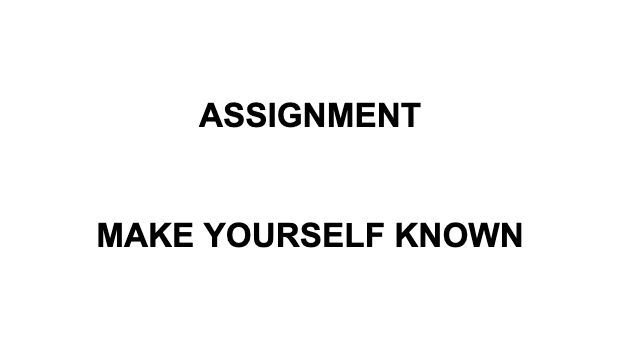
At exactly HALF-PAST TWO we began the journey.
All members of the orchestra were seated somewhere other than in their regular section. Happily, three of the choicest seats in the front row were empty. That gave me the opportunity to address one of the mysterious quirks of human nature. We work and compete all our early lives to get into the first chair and then when the time comes to sit in a group, we leave the front row empty, saying to ourselves: “Surely that must be for the important people”.
I reported on my amusing experience as a speaker on Leadership to organizations and corporate groups. Before the event I always tell the organizers to make sure that the CEO and other top management don’t sit in the front row.
Then, invariably, the front row remains empty. The back row however is always the first to fill up. The back row is an excellent place to escape, to hide, to judge and to criticize. The front row, as we all know, is the place for the leaders, those responsible for the whole enterprise. I then ask enough people from the back row to fill up all the seats in the front, saying “I invite you to do so in the same spirit in which the government invites you to pay your taxes.”
Of course, that makes all the difference to me because I now have this eager group of people filling the first row! The next time you go into a room, you might remember that you have a choice to either sit in the front row, or hide, escape, judge or criticize in the back. Once we have identified or “distinguished” the front row as a place for taking initiative, being responsible, fully attentive, engaged and alive, it doesn’t matter where you sit.
It’s called “SITTING IN THE FRONT ROW OF YOUR LIFE”.
I recognized that everyone was eager to start playing, especially after such a long time of Covid-19 enforced inactivity. But, I said, we are going on a journey – a journey that will last till the end of June next year. It is important that the ship is prepared.
First, I had to introduce the Crew.
The Captain of the Ship: Elisabeth Christensen (Managing Director)
Everyone knows Elisabeth because she has already interacted with every one of you, including many of your parents. She organized and was present at all the auditions and has managed all the enrollment processes. She also manages the Boston Philharmonic, the Board, the outreach; the subscriptions, the staff, the Press. – in fact, everything.
Most aspects of the organization are under Elisabeth’s expert guidance. PLEASE, out of respect and for maximum efficiency, answer her communications speedily. 24 hours is the reasonable limit for a response to her requests, enquiries and questions. We are all busy. Being a leader means you always make time to respond.
Elisabeth is a professional violist (leader of the violas for the Plymouth Symphony Orchestra), a viola teacher, as well as organist for her church. She is probably the most experienced and effective youth orchestra tour manager in America. The BPYO could not run without Elisabeth.
Please, always remember that and treat her mastery and generosity with respect.
Mark Churchill and I have worked together for over 50 years. He, Elisabeth and I started the BPYO 10 years ago. We guide it together. Mark is a cellist (he was my cello student at NEC), conductor, teacher and one of the great music education visionaries in this country. He is our cello coach and one of the most interesting people you are ever likely to meet.
The new Production Manager is Derek Wohl (Wohl means “well” in German, as in the first movement of Beethoven’s op 81 piano sonata: Lebewohl – i.e. live well or Farewell) He is well named. On his first day he was mightily tested when at 9 a.m. he called Elisabeth to inform her that the truck carrying all the percussion instruments and stands had been in an accident, with the driver in hospital. By the time the rehearsal began percussion instruments had been found and stands had been borrowed from BU. How did THAT happen?
Don’t ever take the production staff for granted. Especially on tour!
The Librarians Sage and Jo have been hard at work marking and copying all the parts. They are including the score of the Haffner symphony in your folders, so that you can participate as conductors, even if you are not playing.
Alfonso José Piancentini is my Musical Assistant, deeply involved in helping me with all aspects of the venture. He worked tirelessly since last September to make a success of the Covid Journey of conductors. (more of that later). He is in the second year of a Masters in Conducting at BoCo
Iverson Eliopoulos, Personnel Manager played cello for 6 years in BPYO. He graduated from Tufts and is now starting a Masters in Conducting at NEC. No one is more passionate or committed to this orchestra than Iverson. Please cooperate with him by keeping him up-to-date with information in a timely fashion.
Remember we need two week’s notice for a REQUEST to miss a rehearsal.
MASKS
It is extremely disappointing for all of us that we still find ourselves in the midst of the pandemic. In June we had reason to hope that it would all be behind us by now and we could return to normal life and activities without masks.
So, now we have to still deal with it, though the situation in Massachusetts is better than in most other parts of the country. Everyone has been double vaccinated and will wear a mask except when actually playing a wind or brass instrument. I am unable to wear a mask while conducting, but I have agreed to be tested before each rehearsal and I am having my 3rd booster shot today.
The hardest thing about the enforced mask wearing, apart from the inconvenience, is the difficulty in recognizing or hearing people. I therefore ask everyone to wear a clearly visible name-tag, with large lettering and to speak with a loud voice and great clarity.
This is excellent leadership training, since, to be an effective leader, you have to speak loud and clear.
It is a good habit to state your name when you go up to speak to someone. People appreciate it.
ASSIGNMENT
Each week there will be a leadership assignment. The first one is:
MAKE YOURSELF KNOWN
Trust that everyone wants to know you. For that, words become important; relating becomes important; being expressive becomes important.
This is hard when half your face is covered with a mask. Hopefully it won’t last too long. Meanwhile, find ways and practice making yourself known in every situation.
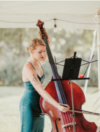
Just as we have some spectacular instrumental virtuosi in the orchestra, we have some spectacular communicators. Double Bassist Alyssa is an example. She could be a leadership coach. Actually, come to think of it, she IS a leadership coach. Try to get to know her and see if any of it rubs off on you.
Nikki Naghavi is another. Incidentally Nikki has an Instagram site for violinists with 61,400 followers! Check it out!
WHO ARE YOU?
105 players between the ages of 12 and 21. About 46 are in high school,
or in a few cases, middle school, the rest are in college. You come from all over New England and, even beyond. If you come from NEC it takes about 7 minutes to get to the Reflection Hall, if you come from New Jersey, or New York City, or Damariscotta, Maine, it takes between 3 to five and a half hours each way!
That is one of the reasons we rehearse for 4 hours. For people who come such a long way once a week, we want to make sure it is a really worthwhile experience Another reason is that we perform very hard repertoire, in very prestigious venues. These works make enormous demands on us technically, intellectually and emotionally. They cannot be prepared quickly.
We have always had sectionals in the first hour but we no longer have a space for the various instruments to spread out around the building, as we had at the Benjamin Franklin Institute. We haven’t solved the absence of separate rehearsal spaces, but we are working on transforming the method of rehearsing to compensate for the loss of this crucial aspect of the program.
An enormous amount depends on your willingness to practice your parts thoroughly at home. A work like Mahler’s 4th is extremely complex even for professional orchestras. Listening to it over and over, in many different versions, is a great way to get prepared.
WE TREAT EVERYBODY AS EQUAL WITH RESPECT, INTEREST AND LOVE
SEATING
We have fixed seating in the strings for 4 stands in the firsts; two in the seconds, violas cellos and basses. The rest are rotated at each rehearsal.
For the winds and brass every effort has been made to give you a valuable experience. There are several other opportunities through the year.
There might be changes.
WHAT HAPPENED IN COVID
In September I invited the members of BPYO to go on a journey into music, imagining they were conductors.
We held weekly meetings on Zoom in which we approached music and life with the mentality of a conductor: taking responsibility for the whole.
I knew it would be hard to keep up interest and participation on Zoom, so I likened it to Sir Ernest Shackleton’s harrowing journey to Antarctica and made it voluntary. It was not for the faint of heart! Not everyone signed up for the journey, but those of us who did, had a very stimulating time.
Each member was sent a full conductor’s score of Mahler’s 4th, which we studied together over many weeks. It was because of that that I decided we would continue to study the 4th this semester and perform it in our first concert in Symphony Hall on November 19th. This meant that our low brass (3 trombones and tuba) would have to wait till after that to play, because Mahler did not write for low brass in the 4th.
However, they still could take part in the current journey, because my intention is that we can continue what we learned last year and have everybody seeing themselves as conductors.
I was immensely pleased that some of them stayed on Saturday to watch the rehearsal, even though they weren’t playing.
I told the story of the great Eugene Lehner, who sat for 43 years in the viola section of the Boston Symphony waiting for the Maestro to call him up to conduct – “so that I can go to the back and see how it sounds.”
It never happened, but he said he never had a dull moment in a rehearsal
because he was always thinking: “what would I say to the orchestra if I was called up.”
All the Zoom classes last year were videoed and will be placed on my new website, now that Alfonso has carefully edited them down to their essence. Until the website is up and running, Alfonso will periodically send you relevant videos.
There was also, for most of the classes, a detailed Recap (like this one) to remind people of the content and to elaborate on many of the points. Alfonso will send those too when appropriate. That way, those who were not on what we came to refer to as “the Shackleton voyage on the Endurance”, will have some of the benefit, and those who were, can be reminded of what we learned, now that we are back in action “in person”.
On Saturday, I focused on one particular aspect of musical interpretation – the 4-bar phrase. I explained that in a normal 4-beat bar, everybody knows that the first beat is heavy, the second light, the third heavy, though lighter than the first, and the fourth beat is light. There is no argument about this amongst musicians, it is a universally accepted rule of musical grammar. There are, of course, infinite variations and permutations created by the different notes, harmonies, rhythms, registers and dynamics in any given bar, but the underlying structure of the heavy/light in the 4-beat bar is a constant in most Western music. It is even manifest in our language: Freu-de schoen-er, Götter-funken
If you speed up the four beats in a bar of the Ode to Joy from a slow 4/4, the bars come to be felt like 4 beats in a hyper-bar, the same principle applies.
I then went on to describe some of the forces that can threaten or counteract the heavy/light 4-bar structure.
Musicians instinctively tend to lead:
- When the music goes up to a higher note
- When there are repeated notes
- When it goes to a long note
- Or to a dissonance or an accent
This creates a tension between the heavy/light bar structure and the shape of the phrase, which adds immeasurably to the complexity, excitement or ambiguity of the performance.
For instance: In the first phrase of the Ode to Joy the music rises to a higher note on the second (weak) bar (Freude schöner Götter-funken), but the impulse still comes from the first beat of the first (strong) bar –“Freu-de”
In the Haffner, bar 6, the first violins will instinctively feel like making the 6th bar an up-beat leading to bar 7 (repeated notes, plus a leap up to a higher, longer note) but it’s much more interesting and subtle to have them feel the impulse coming from the first beat of bar 6 and still feeling the intensity through to the D and then later the D#.
I explain all this much more thoroughly and with many musical examples in the Zoom class, including Mary had a little Lamb and Row, row, row your Boat. I bet you didn’t think about these children’s songs being in 4 bar phrases!
Sequences take precedence over heavy and light bars. So that as long as the sequence lasts, the heavy/light principle is suspended
I have asked Alfonso to send you the Recap essay on the 4-bar phrase. I am not aware that this material has ever been thoroughly written up, so it’s worth your time to plough through and actually sing and play the examples.
A couple of days ago I did a Webinar in Melbourne, Australia (Topcast) with a listening audience of 300,000 music teachers. I am planning to send that Recap on the 4-bar-phrase to them and to the 274 conductors with whom I worked on Zoom during the lockdown. Many of them will be watching the Livestream of our concert on November 19th! So, let’s get to work!
By now, it was time for a BREAK so that the stage could be set and stands brought in.
– BREAK –
MAKE YOURSELF KNOWN
Since there is a break, I thought this would be a good place to put a couple of the reflections from BPYO members who went on the Zoom Conducting Journey last year.
For those who were not “on board” these reflections might give a sense of what transpired and explain why those of us who took this “journey” look back on it with such satisfaction and joy.
First from Michael (cellist, Junior in high school))
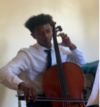 To me being in an orchestra meant simply to play through your part when asked during rehearsals, often on auto pilot. With BPYO however, our experiment of all participants putting themselves into the shoes of a conductor made it impossible for me to “rehearse on auto pilot.” Thinking like a conductor every Saturday afternoon taught me more than any music theory class, chamber group, master class, or orchestra I have experienced prior. I learned so much about tempo choices; phrasing while thinking about heavy/light bars, how editors can influence the way music is traditionally played after a composer’s death, how to perform with intensity and expression, how to read an orchestral score, rubato, the Schenker principal, Alexander technique, Mahler’s tragic life and music; one-buttock playing (and much more), as well as how to go about living life through the weekly assignments, the Art of Possibility readings, and at the start of our experiment, rejecting the Downwards Spiral.
To me being in an orchestra meant simply to play through your part when asked during rehearsals, often on auto pilot. With BPYO however, our experiment of all participants putting themselves into the shoes of a conductor made it impossible for me to “rehearse on auto pilot.” Thinking like a conductor every Saturday afternoon taught me more than any music theory class, chamber group, master class, or orchestra I have experienced prior. I learned so much about tempo choices; phrasing while thinking about heavy/light bars, how editors can influence the way music is traditionally played after a composer’s death, how to perform with intensity and expression, how to read an orchestral score, rubato, the Schenker principal, Alexander technique, Mahler’s tragic life and music; one-buttock playing (and much more), as well as how to go about living life through the weekly assignments, the Art of Possibility readings, and at the start of our experiment, rejecting the Downwards Spiral.
Who would have thought that I would learn the most that I have ever learned about music through a computer screen during a pandemic? During every session, I was completely immersed, not only because of the constant fascinating content but also because of Dave and his camera skills. Oftentimes, Zoom meetings can feel a bit stagnant and tend to feel like a lecture, as the speaker stays still, in a box, and speaks. However, Dave’s dynamic camera switching would constantly highlight important events during performances.
Alfonso being alert and one step ahead at all times during the meetings, screen sharing scores, making presentations, and playing orchestral recordings immediately when asked showed a level of professionalism and proficiency with technology that you often don’t see during a typical online meeting. Alfonso also played an instrumental role in the aforementioned weekly assignments and Art of Possibility readings with his email updates. On the off chance that something did go wrong, Elizabeth was there to point it out. She also always had an open line of communication with me throughout the year.
My experience with BPYO felt so fundamentally different from other online classes/meetings. Not only because of the mentioned fascinating content, high production value, and supportive staff and direction but also because of the engagement from the other students. At the beginning of the year, I had a sense of impostor syndrome due to hearing members of the orchestra performances each Saturday of such a high caliber. Since then, that feeling has now morphed into a sort of inspiration and goal to reach.
To Dave, Alfonso, Elizabeth, and Maestro Zander,
THANK YOU for adding light to an otherwise dark year.
And from Thomas, high school senior (oboe) His parents met playing oboe and bassoon in YPO. So, look around.
 My first seasons in the BPYO, I spent my weekdays looking forward to the orchestra rehearsals, where I was privileged to be able to play the most beautiful repertoire with my incredible fellow musicians, learn from my wonderful oboe-section, and eventually be able to tour Brazil. Because I had grown to know and love BPYO in this form, I was at first crestfallen to learn that COVID-19 restrictions had prevented us from being able to have rehearsals as normal.
My first seasons in the BPYO, I spent my weekdays looking forward to the orchestra rehearsals, where I was privileged to be able to play the most beautiful repertoire with my incredible fellow musicians, learn from my wonderful oboe-section, and eventually be able to tour Brazil. Because I had grown to know and love BPYO in this form, I was at first crestfallen to learn that COVID-19 restrictions had prevented us from being able to have rehearsals as normal.
However, as this past season progressed, I began to really appreciate the new BPYO “rehearsals.” Despite the fact that the virtual meetings confined all of us to our little “boxes” of our computers, I found that they were not only wonderful temporary alternatives to our usual orchestral music-making, but that I was actually experiencing growth, both as a musician and as a person, in a way that no ordinary orchestra would have been able to offer. By our studying of Mahler 9 and the various other symphonies, sonatas, and partitas played live in Maestro Zander’s home, I have found that I have been approaching music with a broader lens. I have been thinking more about other instrumentalists and the challenges they go through, how these instruments fit together to form a cohesive orchestral piece, and what roles the different parts or movements of a piece have in the overall architecture of the piece, among many other skills which an oboist would usually not be able to gain through an orchestra. And, the other topics, from Maestro Zander’s childhood stories, to the Schenker principle, were equally beneficial.
I am incredibly appreciative of the level to which Maestro Zander, Ms. Christensen, Alfonso, Mr. Jamrog, Mr. Churchill, and the rest of the crew all contributed to making this season not only worthwhile, but also engaging, memorable, and a unique growth experience.
Christine (violin, grade 10) shared her experience of being both a mentor and a mentee as part of the Mentorship program that was run by Derek Bechvold during the Zoom year. Each BPYO member was offered the chance to coach and mentor a young musician from a disadvantaged area and to be mentored by a member of the Boston Philharmonic:
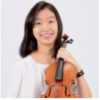
Thank you so much for inspiring me each week through our Zoom meetings!
One of my main takeaways is that there are many possibilities to overcome challenges during this unexpected year. Although I do value being able to connect with the other musicians in person through rehearsals and performance, I feel that I grew in other ways. Most importantly, I have learned that I was only focusing on one perspective or point of view, both in interpreting music as well as evaluating my relationship to other musicians and people in general. There were things I either liked or did not like; I definitely tended to see one side of the world. The art of possibility was a metaphor for my own growth as a person this year. I feel more open minded to different encounters not just with music, but with other people, and even with different kinds of food!
The idea of possibility gives me hope, positivity, and motivation during this very difficult year. I am grateful for your dedication and passion, which has transformed me significantly.
I am also very glad to have had the chance to participate in the Mentorship program, both as a mentor and a mentee. I love being a mentor, especially since I know that I am helping others and sharing my love of music. This is a new opportunity that I had never experienced before. It gave me confidence to be a leader. In turn, I felt cared for by my mentor; she was enthusiastic and gave me great advice. It will definitely help me become a better mentor myself.
Let’s return to the Reflection Hall, at the Christian Science Center
MOZART: “HAFFNER” SYMPHONY #35
When everyone came back, the orchestra was set-up as it would have been in Mozart’s day: first and second violins opposite each other across the stage; cellos and basses on my left and violas to my right.
Having the two violin sections separated makes it much more challenging for the ensemble. But this is a learning experience, so it’s worth the extra effort. In Mozart (and Mahler too), it is the separation of the voices that is crucial (in Shostakovich it is the opposite and Tchaikovsky 6th is a special case). When the violin sections are separate the audience can hear when they are playing together and when they are separate, as well as appreciate the antiphonal nature of the writing.
Having the cellos and basses on one side, far away from the bassoons is ideal, so that the bassoons can always be heard. Also having the inner voices (2nds and violas) together is illuminating.
The terrific effect of all these separate voices will be especially clear in Symphony Hall.
I shared the letter that Mozart wrote to his father (about the 34th symphony)
”…..I forgot to tell you the other day that at the concert the symphony went magnifique and had the greatest success. There were forty violins, the wind instruments were all doubled, there were ten violas, ten double basses, eight cellos and six bassoons.”
OMG! Imagine! A huge orchestra. Well, we are a little short a couple of bassoons, but that is almost exactly the orchestra we have. So why not?
It means that the leader of each wind section will have to decide when the section will play ripieno (all together) and when just two players should play. It will usually be pretty obvious. The Assistant players always have to be prepared to step in to play a solo part, even in a concert on tour, where exhaustion or illness sometimes necessitates it.
I began by doing a demonstration of the remarkable acoustical phenomenon that 70 string players can play just as softly as 4. I asked Nikki Naghavi, the concert mistress for the Mozart, to play a note quite softly. I then invited all the strings, one by one, to add their sound to that same note. By the time all 70 players were playing, the sound had not increased by a decibel. Eureka! This showed that a very large orchestra can play as softly as a very small one, provided everyone is very concentrated and focused on the sound of the whole.
“it is not YOUR pianissimo,” I said, “it is the composer’s pianissimo.”
I then introduced Cynthia Roberts – a friend from way back. She was concert master of Youth Philharmonic Orchestra at NEC 45 years ago! – she played the Brahms concerto with the orchestra – a most unusual feat for a 16-year-old. She has gone on to become one of the leading baroque and classical violinists of the day. She is a professor at Juilliard and travels the world leading such orchestras as Tafel Music; the period orchestras of Roger Norrington and William Christie and coaching the strings at New World and colleges and professional orchestras in historical performance practice. She showed us her original 1671 Steiner violin, all set up for lowered pitch and gut strings, as well as her modern imitation of a Mozart bow.
She told us that she had learned all about heavy and light bars from me when she was in high school and has incorporated it into the style with all the orchestras she leads.
Cynthia will be coming as often as she can in between her hectic Juilliard/New York life and travel schedule. A few bars of demonstration was enough to get everyone to lighten the bow and play over the bar-lines in long phrases (all organized in heavy and light pairs, of course)
Her colleague, baroque cellist Phoebe Carrai, who was also my student at NEC in the 80’s and is now also a professor at Juilliard and one of the top baroque cellists in Europe, will also be coming by whenever she is free on a Saturday, to guide our 16 cellos and 8 basses into evanescent lightness.
You can see them playing an informal concert in my driveway at a Safe and Sound concert a couple of weeks ago. Click here.
Cynthia was very excited about the way you all were playing the Mozart even at a first reading. She had to leave to play a concert on the Cape, but she sent a message:
Dear Ben,
Your rehearsal yesterday was the most inspiring rehearsal I’ve ever seen! I’m so glad I was able to hear the first notes after a year and a half!
I just got back to NY because early tomorrow I go to Eastman for two days to work with the string players there. Then Wed to Dallas for the University of North Texas and Sat to LA for some concerts!
I shall keep the inspiration!
Love,
Cynthia
I can’t wait to see how our two classical-era coaches will help transform our approach to the Mozartian style, in spite of the huge numbers.
It promises to be: A monster Haffner of unparalleled delicacy.
WHITE SHEETS
There is always a “white sheet” on your stand. You may reflect on any aspect of the experience. You can offer comments, suggestions, ask questions, share your experience. It is a private communication with me which I always welcome. I will often respond. I will only share it if I think others will be moved or enlightened by what you say. I will never share something private or personal without checking with you first. You may also express dissatisfaction, disagreement or frustration. We can only learn and develop if we are challenged. Every white sheet must be signed, so that the conversation can continue. If it is critical, we take it as coaching.
Here is a rather poetic “white sheet” written as an e-mail from Jaehyun (Jane), (first violin, 15, sophomore at Exeter) on Sunday morning. I have edited it down to focus on one particular point, which I found especially touching:
 Dear Maestro,
Dear Maestro,
I write to you approximately twelve hours after the conclusion of our first rehearsal of the season and my first ever rehearsal with the Boston Philharmonic Youth Orchestra.
As we neared the end of rehearsal, you suggested that we test the waters of the third movement of the Mahler Symphony. As the sixteen bars of rest greeted us, my stand partner and I looked at each other in disbelief and simply chuckled. Certainly, we did not wish to count 64 beats in silence. But also waiting for what Mahler had in store for us, I abandoned all qualms and breathed with your cue.
The third movement begins with a beautiful trio composed of the viola, cello, and double bass sections, with the second violins subsequently joining in. Roughly six bars into the rest, I began to feel something internally that I’ve never felt before. A realization of why music brings people to tears. A realization of why music is the universal language.
Those 64 bars have so much in them, so much energy, exuberance, and joy. Sitting right beside the cellos, I was able to feel the connection between the music and me and the exchange in gifts was palpable, and that is what sparks emotion from the crowd. So, I write this white sheet to thank you for giving me the opportunity to explore beyond the mere notes on the paper and inviting me to share a bit of the joy I feel while playing to the BPYO community – counting down the days till HALF PAST TWO!
Zoey, senior, violist from Winchester High had a very interesting observation about her experience of playing in the National Youth Orchestra this summer and then returning to BPYO.
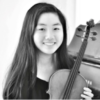
Hello Mr. Zander,
I am sure you got many white sheets thanking you for a great first BPYO rehearsal today, but I wanted to send an email expressing and explaining my gratitude.
Over the summer, I attended the National Youth Orchestra program at SUNY Purchase College for one month. I made many wonderful friends, worked with renowned faculty, and played with some of the best young musicians around the nation. Despite not being able to play at Carnegie Hall or on tour this year due to covid, I was still extremely lucky to have the opportunity to be a part of the orchestra. We made professional recordings with some of the nicest equipment I’ve ever seen, and it was all paid for by donors and Carnegie Hall. (They so far have only released our recording of Tchaikovsky 6 on Youtube which you can find here if you are interested).
Despite all these amazing opportunities I had at NYO, I found myself beginning to feel uninterested and sick of orchestra at the end of each day. I was not appreciating the rehearsals, and I felt so much guilt knowing how many other teenagers would kill to be in this orchestra. I asked myself many times “Why am I not enjoying orchestra?” Towards the end of NYO, I decided it was simply because orchestra was not for me, which was a very upsetting realization as someone considering a music path.
Because of this, I was scared that I would feel the same way in BPYO. Leading up to today’s rehearsal, I told myself to keep an open mind, but I was still fearful of disappointment. However, instead of disappointment, today’s rehearsal gave me reassurance. I felt the excitement in being in orchestra again, assuring that orchestra IS for me. I do not know exactly what changed, but while playing the first movement of Mahler, I thought to myself, “This feels right”. I noticed my presence and purpose in rehearsal, something that I have not felt in a while. I am excited for a great season of music making with BPYO, and I want to thank you for giving me this opportunity to rediscover myself in orchestra.
Best,
Zoey
BZ: Zoey, this gets to the very heart of the matter. Isn’t it interesting that no amount of prestige, fancy equipment, or great technical excellence will get you to the “heaven”, where the heart and the mind of the performers are engaged with the spirit of the music we play? We had that union on Saturday and I will do my best to make sure it happens every Saturday. I am not sure what it is either – energy, love, open-heartedness, clarity of phrasing, joy? Let’s keep enquiring.
Perhaps some of you can add to the conversation:
Here is Tristen (NEC Junior first clarinet in the Mahler). He writes about the serious problem of burn-out, which so many musicians experience, especially in this dark time of Covid. He had a major hand injury last year. He has a job as a problem-solving guru at BMW. He had an experience somewhat similar to Zoey’s.
Hi Mr. Zander!
Today’s rehearsal was almost overwhelming for me. To be truthful, I came into rehearsal thinking “I hope I’m not on the Mozart so that I can work a little longer on Saturdays,” brushing BPYO off as another rehearsal that I have to attend and just another thing in my busy life that had to get done. I realized by the end of the rehearsal just how silly that thought was. I had a blast. This last year was pretty terrible for me and at some point I was very seriously considering giving up music as my career choice. I just kept thinking about how I couldn’t afford to continue school, how I haven’t been playing for a year so I feel so far behind, what if I can’t get in to grad school? So many thoughts were going through my head and I figured it made the most sense to just drop out of school and maybe continue playing music for fun. Until people like you checking up on my progress as a musician, and a pianist I met through work who suffered from similar injuries, and even a doctor I met at BMW who spoke to me about how much she missed music and how much she wished she’d never given it up. You guys reminded me of why I love music. Not only for the joy of playing, but also for the amazing community that comes with it and today’s rehearsal was no exception. I didn’t realize how much I missed the (masked) smiling faces around bpyo and all the shining eyes in this orchestra. I had absolutely forgotten about the joys of playing music like Mozart and while I do still need to work, this is absolutely where I want to be. So, I just wanted to thank you for inspiring me to continue down this fascinating path and I look forward to what this year will bring.
Sincerely,
Tristen
Here are the other White sheets, some with occasional comments from me. You can add your own comments if you wish:

Cody (trumpet, sophomore at NEC)
Maestro Zander: D major had long been associated with the sound of triumph. Any early music written for trumpet almost without exception is written in D, and many of these works are associated with spirituality/Christian subjects. It is almost too fitting that our first work together as an orchestra was a D major symphony in an age of resurrection. It is also fitting that such a symphony was composed in the blossoming golden age of Classical Vienna. The sounds of triumph in the face of disease are an age-old tale, even if the triumph is temporary and I could not think of a better way to begin a year after devastation than Mozart.
BZ: Thank you, Cody, for pointing out the appropriateness of starting with the D major “Haffner.”
It was, of course, intentional.
It will be preceded by the dark, sonority of Barber’s Adagio which ends in somber f minor – to remember the sorrow and heartache we have all experienced. From f minor to D major! Can we make the transition without applause? Everybody would have to be on stage from the beginning. Can we go right into Haffner without tuning or shuffling?

Alex: Thank you for making my first full orchestra rehearsal in 2 years so enjoyable! See you next week.
BZ: Amazing to think that we haven’t rehearsed for nearly 2 years!
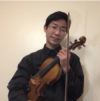
John (1st violin, junior Shrewsbury High school)
Dear Mr. Zander: I did not realize how much I missed playing in an orchestra until today. Everything about this experience has breathed new life into my life, and I cannot wait to return to rehearsal next week! Mozart is so refreshing, and I share your excitement for performing it in Symphony Hall, and its contagious happiness. Extremely excited to live and breathe Mahler again! See you next week.
BZ: Mozart and Mahler, perfect companions. Why?
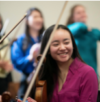
Brianna (1st violin, Freshman, BU)
I am excited to be returning to weekly orchestral rehearsals and seeing everyone in person. Coming here felt like a relaxing oasis at the end of a busy week. In college, everyone is focused on assignments, tests, and the next deadline. While we do have a concert deadline, we still take time to appreciate the present and the moments we are currently in. It is nice to pay attention to the small details in everyday life and I hope to do so moving forward.

Seth Bassoon, freshman at NEC
Today was really amazing. I don’t know how else to say it. The last time I’ve played with more than 15 people was that March 12 concert, and it is just so great to start rehearsal again! It’s so much fun to write in cues, check the score, add your instructions, follow my section, hear other people, etc. So, while we clearly have a lot to iron out, thank you for making this happen.

Nathan Viola, 12th grade
It’s so good to be back to playing music again in person! As I was playing the Mozart, and the Mahler, I couldn’t help but be reminded of the sound that we had crafted and forged in all my years before. I’m super excited that BPYO still maintained its spirit after its short bumps, and I’m glad to be able to look up and see a familiar face.
BZ: Me too!

Bona (Seojin) Cello, Senior at Exeter
I cannot tell you how blessed I felt today to be learning and producing this music with you and all these musicians. Amidst all the stress of senior year and such, thank you for letting me ground myself with this music and for allowing me to rediscover, every Saturday, why it is that classical music is such an important part of my life. With much gratitude.

Isabella Cello, Freshman at NYU, New York
I have thought a lot about the word “journey” since last year. This feels like the beginning of a new journey – I have just started college, I have started a fresh new year of BPYO, and there is so much in store. But this also feels like the end of a journey as in, after a long and hard journey, I am finally home. Can’t wait to make more music with you all!
BZ: I have so much admiration that you make the long journey up from New York City each week.

Graham 1st horn in Mahler, Sophomore at NEC
Brilliant rehearsal! It is so amazing to be in the orchestra again and hearing players play around me, to make music. I felt like we were really beginning to develop the character of Mahler 4: short, peckish and sneaky in some moments, very Till-Eulenspiegel-like, and very romantic and lush in others.
I had a question about the measure of 186 in the 3rd movement of Mahler in the 1st horn part: is it supposed to be an A natural? I thought it was supposed to be a G natural. Please let me know!
BZ: It is G natural (sounding C).
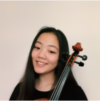
Eunchai Kang Viola 12th grade Andover High school
I can’t even describe what I’m feeling right now. That was amazing. It was like going into a whole new world!! Everyone here is amazing. And so kind. I worried for nothing! I am so grateful for what you do – Ahhh Can’t wait for next week, thank you!
Nicolette Viola freshman NEC with Kim Kashkashian
Thank you for such an incredible rehearsal and experience. I can’t wait for the next rehearsal!
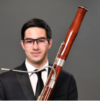
Andrew Salaru Bassoon, Freshman at NEC
We had an excellent rehearsal today! Looking forward to next week!
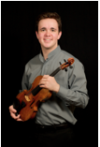
Clay Hancock Leading 2nd violins NEC Junior
Measure 48 1st Movement Mozart. Would you like a double up-up on the second and third note of the measure?
BZ: I think it is fine as it comes. But if you think up-up is better, you will have to coordinate with the firsts, who are with you in 6th’s at that point. Isn’t it amazing that we can go through a 4-hour rehearsal, exploring Mozart and Mahler and storming at the gates of Heaven and still come out caring about the bowing of two notes!
Click here to listen to Ben’s performance of Mahler’s 4th Symphony with the Philharmonia orchestra.
Click here to listen to Ben’s lecture on Mahler’s 4th Symphony.
Click here to listen to Ben being interviewed about Mahler’s 4th Symphony.
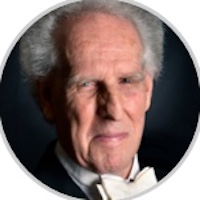 Benjamin Zander
Benjamin Zander